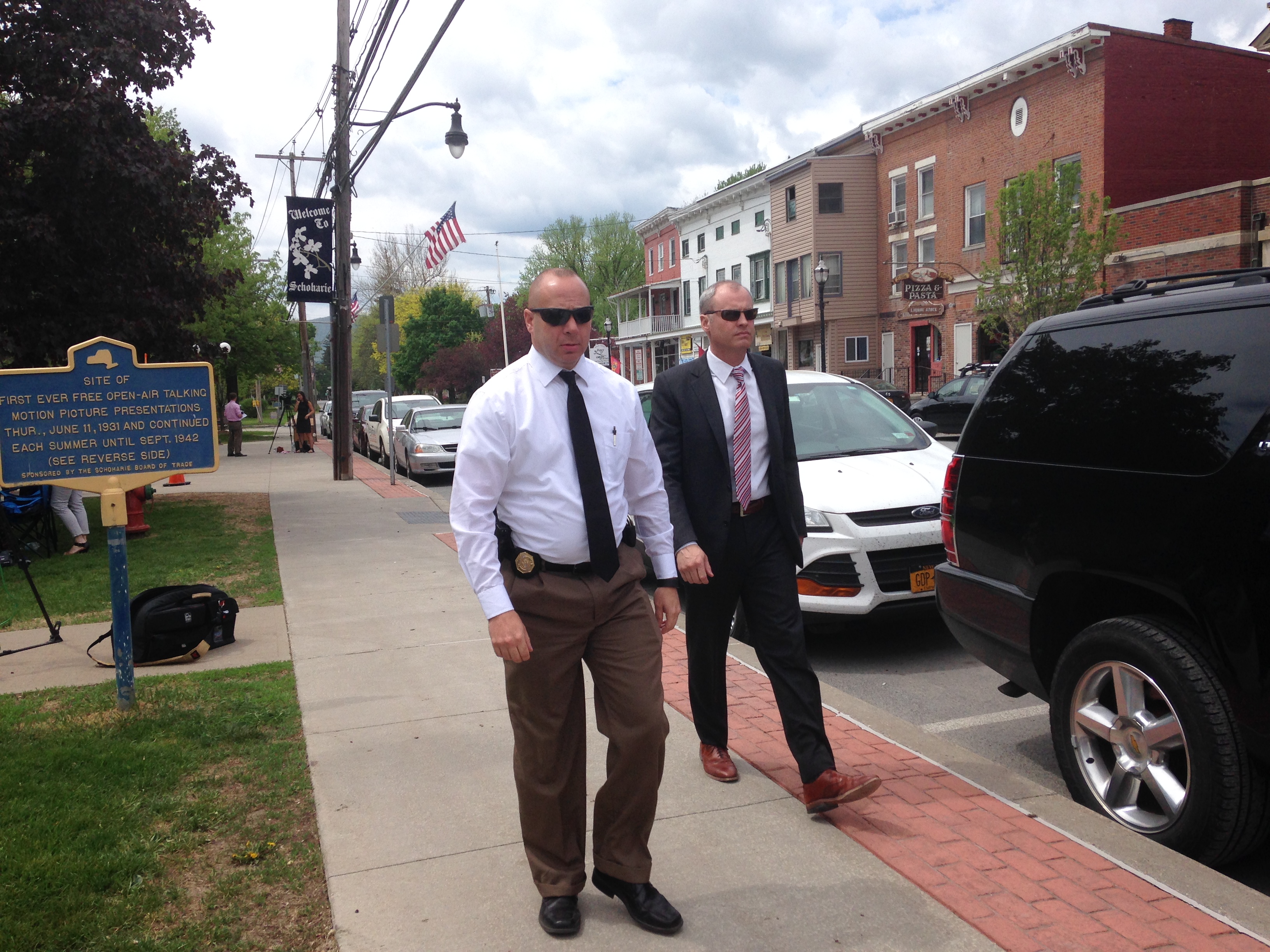
Tioga County District Attorney Kirk Martin, right, heads to lunch with Investigator Allen Ferrara, state police investigator of major crimes, as the jury in the Calvin Harris murder trial deliberates. (Photos by Wendy Post)

Calvin Harris’ daughters, Cayla, left, and Jenna, play Lacrosse outside of the Schoharie County Courthouse as the jury deliberates.
On Tuesday morning, and following brief arguments, Schoharie County Judge George R. Bartlett III rendered a second Allen charge to the 12-member jury serving the second-degree murder trial for Calvin Harris. This second Allen charge came after the jury sent a note to the judge late Monday that they were deadlocked.
And the arguments that came on Tuesday morning, prior to the Allen charge being rendered, were done outside of the jury. The defense continued to object to the Allen charge, while the prosecution continued to argue that it was appropriate.
“Based on the length and complexities of this trial,” said Judge Bartlett, “I’m unable to determine at this point if the time deliberating has been reasonable.” He added, “I’m not asking any juror to abandon their conscience.”
An Allen charge is based on a case, Allen v. U.S., and is an instruction given by a court to a deadlocked jury to encourage it to continue deliberating until it reaches a verdict. This charge is not used in all states, as some find it coercive.
According to the defense, the charge is sometimes referred to as a “dynamite charge”, or “shotgun charge”.
But the defense argued its particular use in this case.
The judge rendered the first Allen charge on Tuesday, May 5 in the early afternoon and after four days of deliberating. The jury then went back into deliberations, but found they deadlocked once more, five days later.
In the jury’s note to Judge Bartlett, late Monday afternoon, they noted, “… efforts to continue would be fruitless.”
Defense Attorney Bruce Barket argued that the jury was obviously as far as they could get, and he stated that one of the jurors was even crying, although this could not be verified.
Defense lawyer Donna Aldea then jumped in and argued the language of the charge, and recommended that the jurors be polled to see if they were unanimous on the deadlock.
“For fourteen weeks they have put aside their lives,” said Aldea. “This after jurors were coming out crying,” she added.
But in spite of defense arguments, Judge Bartlett declined an application for polling the jurors and moved forward with the Allen charge at 10:50 a.m., sending the jury back into deliberations. The judge did, however, soften the charge by instructing the jury that he will stop the deliberations when he feels it is reasonable time.
The jury only had one request on Tuesday, following the Allen charge, and that was the read back of the charge regarding motive and intent – with intent being an element of a second-degree murder charge.
The jury will return on Wednesday as they enter their tenth day of deliberations. As of Tuesday afternoon, the jury had deliberated for 48 hours and 20 minutes.
Calvin Harris, age 53 of Spencer, N.Y., is on trial for a third time for the alleged murder of his wife, Michele Harris, who disappeared in September of 2001. Two previous convictions were overturned, and this new trial ordered in Schoharie County. Neither her body nor a weapon has ever been found.
The prosecution maintains that Calvin Harris murdered Michele Harris on Sept. 11, 2001, and has based this circumstantial case on blood spatter found inside the Harris’ home, as well as motive and behavior.
The defense claims their client is innocent, and that the prosecutors failed to look at other potential suspects.


